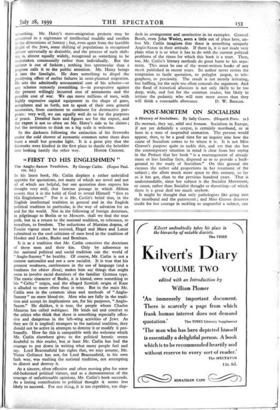“FIRST TO HIS ENGLISHMEN"
IN his latest book, Mr. Catlin displays a rather unbridled appetite for quotations, not many of which are novel and not all of which are helpful, but one quotation does express his thought very well, that famous passage in which Milton asserts that it is the habit of God to reveal Himself "first to His Englishmen." For it is Mr. Catlin's belief that, in the English intellectual tradition in general and in the English political tradition in particular, is the way of salvation for us and for the world. Not in the following of foreign doctrines, in pilgrimage to Berlin or to Moscow, shall we find the true path, but in a return to the national tradition, to tolerance, to moralism, to freedom. The seductions of Marxian dogma, of Fascist vigour must be resisted, Hegel and Marx and Lenin submitted to the cool criticism of men bred in the tradition of Hooker and Locke, Burke and Bentham.
It is as a tradition that Mr. Catlin conceives the doctrines of these men and their kin. Only by adherence to the national political and social tradition can the world of " Anglo-Saxony " he healthy. Of course, Mr. Catlin is not a narrow nationalist and not a new racialist. It is true that his greatest weakness, carelessness in the use of language (and a fondness for obiter dicta), makes him say things that might seem to involve racial doctrines of the familiar German type. The exotic character of Burke, it is hinted, owes something to his " Celtic " origin, and the alleged Scottish origin of Kant is alluded to more often than is wise. But in the main Mr. Catlin sees in the common ideas and methods of " Anglo- Saxony " no mere blood-tie. Men who are fully in the tradi- tion and accept its implications are, for his purposes, "Anglo- Saxon." He dislikes, it is true, the people whom Charles Maurras has called miteques. He lends aid and comfort to the critics who think that there is something especially offen- sive and dangerous in the left-wing activities of Jews. As they are (it is implied) strangers to the national tradition, they should not be active in attempts to destroy it or modify it pro- foundly. How far this is compatible with the welcome which Mr. Catlin elsewhere gives to the political heretic seems doubtful to this reader, but at least Mr. Catlin has had the courage to put down in writing what many people feel and say. Lord Beaconsfield has rights that, we may assume, Mr. Victor Gollancz has not, for Lord Beaconsfield, in his own lush way, was exalting the national tradition, not attempting to distort and destroy it.
As a sincere, often effective and often moving plea for some old-fashioned political virtues, and as a demonstration of the courage of unfashionable opinions, Mr. Catlin's book succeeds. As a lasting contribution to political thought it seems less likely to succeed. For one thing, it is too repetitive, too slap-
dash in arrangement and unselective in its examples. General Booth, even John Wesley, seem a little out of place here, un- less Mr. Catlin imagines that there is something uniquely Anglo-Saxon in their attitude. If there is, it is not made very plain what it is or what it has to do with the current political problems of the times for which this book is a tract. Then, too, Mr. Catlin's literary methods do great harm to his argu- ment. This must be one of the worst-written books of any merit published in recent years. Its author never resists the temptation to facile quotation, to polyglot jargon, to tele- graphese, to preciosity. The result is not merely irritating, but baffling, for the style too often conceals the argument. And the flood of historical allusions is not only likely to be too deep, wide, and fast for the common reader, but likely to irritate the pedantic who will note more errors than they will think a reasonable allowance. D. W. BROGAN.








































 Previous page
Previous page